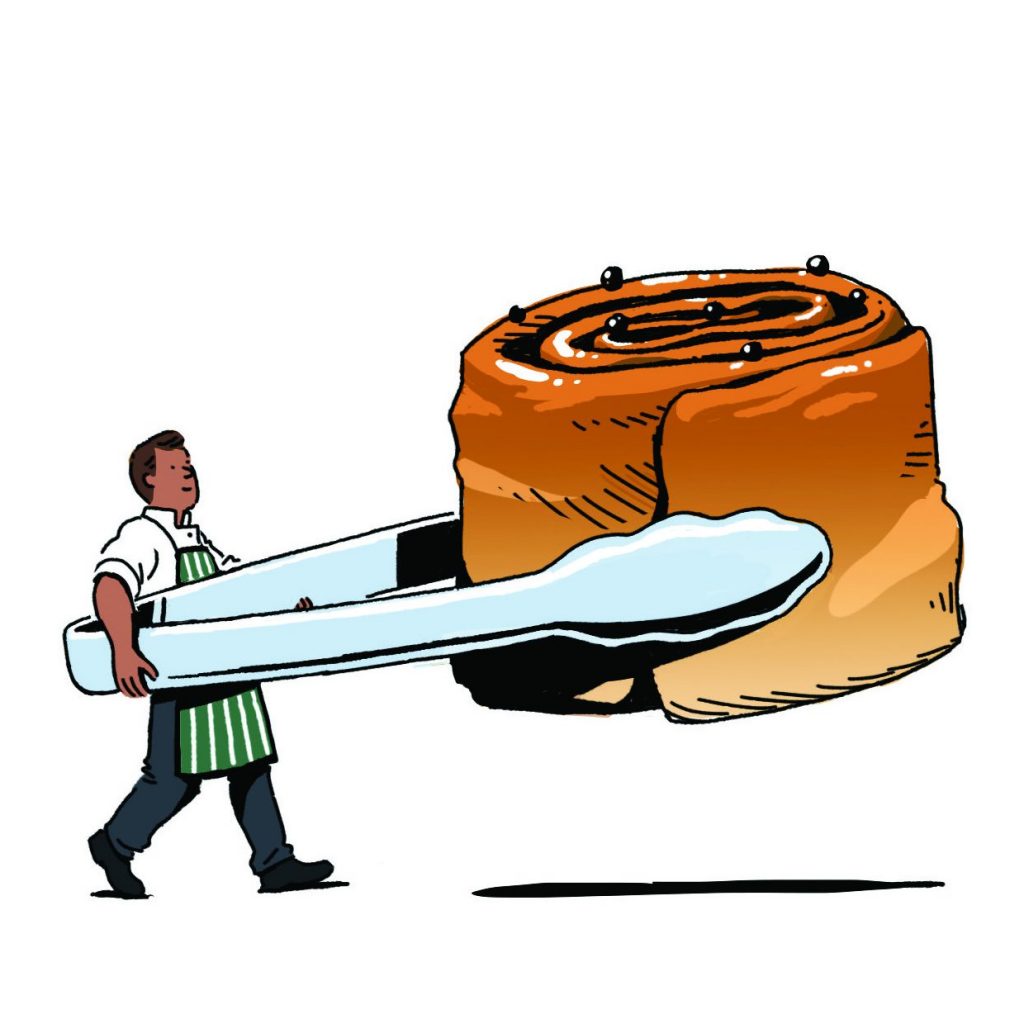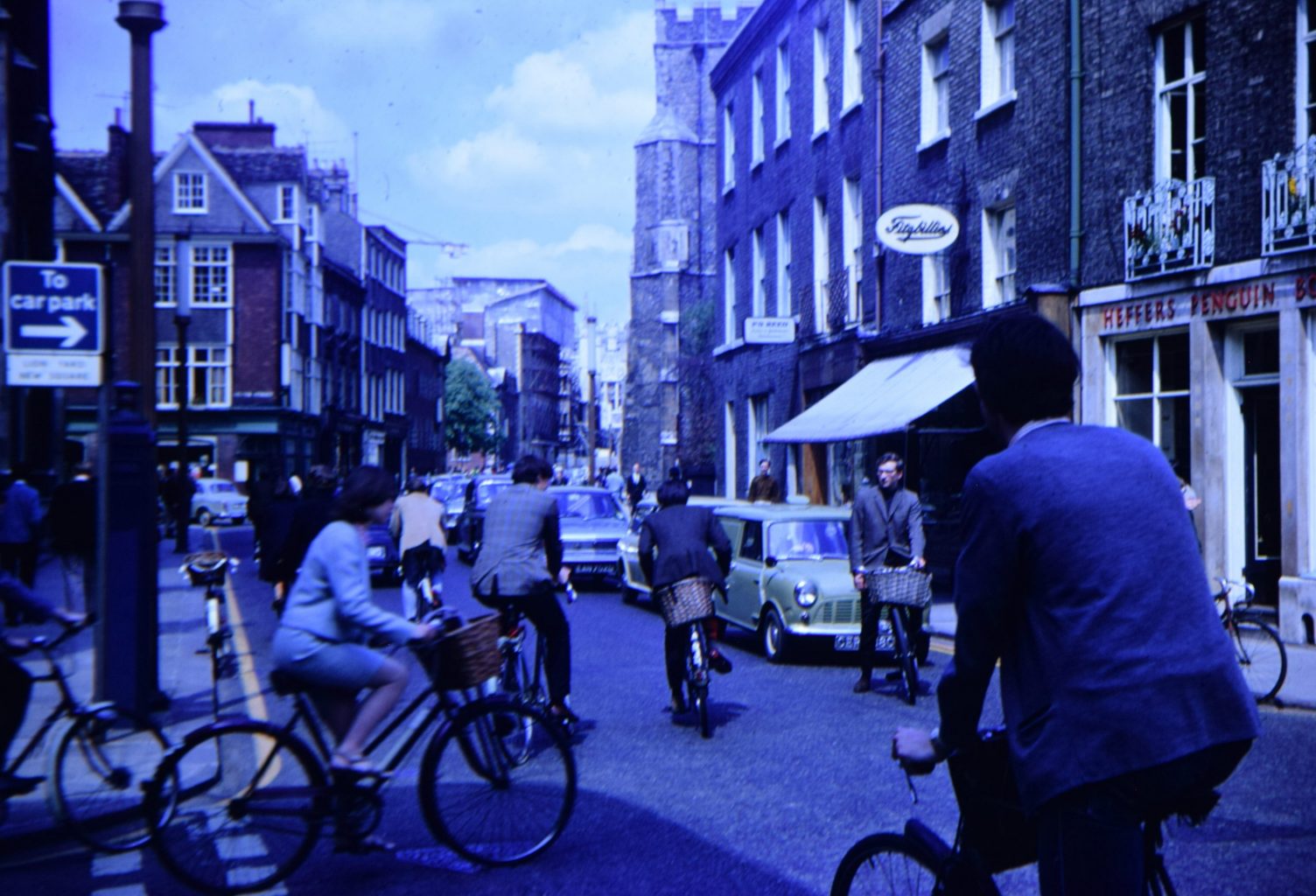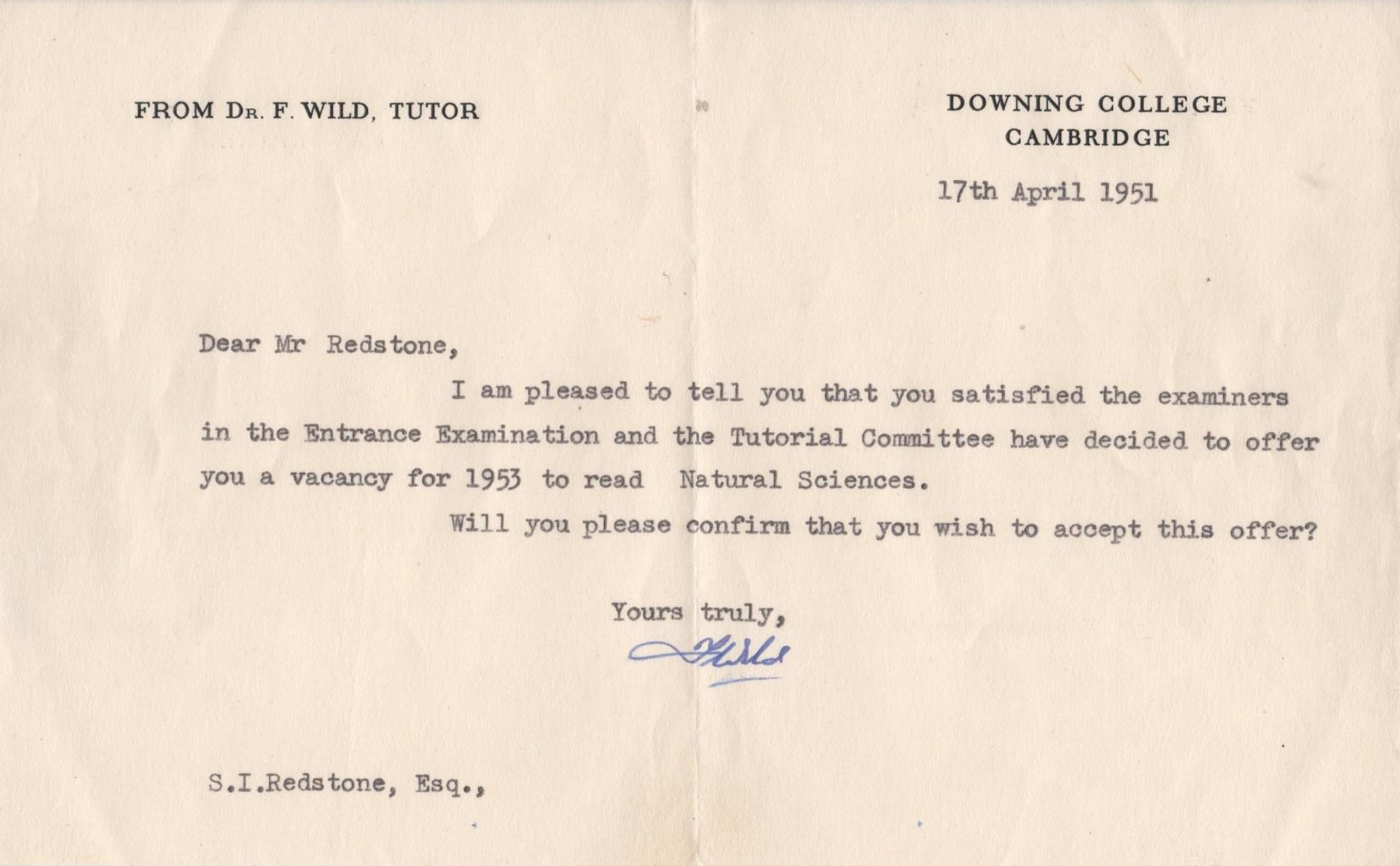Inbox 91
Editor’s Letter
Welcome to the Michaelmas Term edition of CAM – and to a University operating under Covid restrictions. But as experts from across the University further our understanding of coronaviruses, the University and Colleges have been working hard to ensure that students could return to their studies. Pro-Vice-Chancellor for Education, Professor Graham Virgo, outlines the steps that have been taken to ensure Cambridge life can continue safely.
Elsewhere, we explore the activities of the Cambridge University Tape Recording Society, whose members would go on to revolutionise sound technology, and Dr Niamh Gallagher explains why Irish history does not stop at the island’s borders.
On 1 October, in his annual address, the Vice-Chancellor, Professor Stephen J Toope, announced that the University will cut its greenhouse gas emissions to net zero by 2038 – more than a decade before the date set by the UK government. A key focus of Cambridge Zero – alongside divestment, research, education and outreach – will be the planned new National Centre for Propulsion and Power. Professor Rob Miller explains why it means that you may, one day, have a green flight.
On these topics – and on all things Cambridge related – we look forward to your contribution to the debate by post, email or on social media.
Mira Katbamna (Caius 1995)
Inbox
Fitzbillies
My husband (Philip Syed, Trinity Hall 1944) and I knew Fitzbillies in 1946-47 when it was most often, sad to say, closed. It would open, briefly, and having sold what they had would close.
Friends of the previous generation told us, “Oh, you’ll go to Fitzbillies!’, but memories were almost all there were. Now we are in our 90s, deaf and, in my case, in a wheelchair. But we can give a cheer for Fitzbillies and hope it goes on for several more hundred years.
Jean Syed (Bedford College for Women, London, evacuated to Cambridge in 1946)
“Bunmongering”! What a fabulous neologism! Although I used to prefer the Whim [café].
Steve Smith (Trinity Hall 1970)
Editor’s note: we are delighted to see that you are all still paying attention!
I well remember Chelsea buns and dough cakes. What I never got to the bottom of was the mysterious ‘Fitzbillies’ bag’ given to favoured customers. When in the shop with such a customer, she (usually) would buy something, then, without comment, pass over the empty bag to the assistant who would disappear with it behind the scenes and reappear with the bag, which was no longer empty.
I never found out what the delicacies were, or how to get a bag, but I was told when the owner [of one of these bags] went up [from Cambridge], she/he would hand it on to a friend. Not ‘under the counter’, but ‘over the counter’!
June McNicol (Newnham 1944)
In the early 1970s, I sang ‘for my supper’ as a soprano at Pembroke’s Evensong. After dinner, the choir went to the Dean’s rooms, where he would treat us to Fitzbillies’ large, flavoured sponge sandwich cakes. What memories!
Jenny Knowles (Homerton 1969)

Fitzbillies’ Chelsea buns may be what most remember, but, as someone who didn’t appreciate things containing currants, raisins and sultanas, what I recall with most affection is their chocolate cake.
This was a chocolate Victoria sandwich, surrounded by a wrapping of marzipan, topped with peppermint icing and a chocolate button in the middle.
It would probably be expensive nowadays, but it was delicious! And worth it – the chocolate cake helped in courting the young lady who has been my wife for more than 50 years!
Peter Radford (Pembroke 1961)
What an utterly delightful read! I remember licking my hands several times in the course of enjoying a tart – to the distinct disapproval of my hoped-for sweetheart. I didn’t care. Rock on, Fitzbillies!
Ron Johnstone (Homerton 1982)
In the 1950’s undergraduates seemed constantly hungry, and scarce cash was spent on afternoon tea. The best teas were either at the University Library, or in one’s room at College with a Fitzbillies sponge cake. Do they still sell these outstanding cakes? One hopes so, for the sake of present- day hungry students.
John Gibson (Downing 1954)
In life the most wonderful thrill is / To guzzle a cake from Fitzbillies. / The one that excels i’ / ‘S the bun named the Chelsea / ‘Twas always the best, and it still is.
This was a limerick that I composed some years ago and asked Fitzbillies to include in an online order for a box of their unique Chelsea Buns to be sent to my brother for his birthday. The then proprietrix, Penny Thompson, emailed back to say that she was so pleased with it that she would like to include it in the Accolades page on the Fitzbillies website, and asking for my permission to do so. Of course I agreed, and I was delighted to see it soon sharing space with Stephen Fry’s own hymn of praise to the luscious delight.
However, my pleasure at its appearance was slightly tempered by my disappointment at a slight alteration in form: in their entry they had taken the ‘S from the fourth line and stuck it, without apostrophes onto the end of the third line – grammatically more correct, but playing havoc with the Tom Lehrer-style rhyming.
But I left it unchallenged, reasoning that it was their website and they would have it the way that they wanted.
The situation remained thus until a few years later, when I emailed Penny Thompson to say that I was disappointed not to be able to introduce myself in person to her on a recent visit to Fitzbillies for tea and buns; and I took the opportunity to mention the slight discrepancy in the limerick.
She wrote back to say that she and her son (who called himself Pedantosaurus Rex) were both appalled by their oversight and for dulling the lustre of such a finely crafted piece of work and offering her sincere apologies. Somehow this gradually expanded into a most rewarding and much treasured email correspondence over some years covering all our shared grumps.
I was devastated by the news of Penny Thompson’s enforced closure and the prospect of the disappearance of such an essential pillar of Cambridge life, but delighted when the new owners rescued it from extinction.
However, my delight was somewhat tempered by their removal of the accolades page and, with it, my limerick; and I am left wondering whether my piece of doggerel was, perhaps, the reason for the demise of the accolades page.
Peter Gardner (Trinity Hall 1953)
I am afraid I don’t have any memories of Fitzbillies. However, I do recall some delicious Chelsea buns!
I was at Homerton in the middle 60s and we used to frequent a shop between the College and the railway bridge which we called “Dolly’s”. About mid-morning Dolly would have a delivery of really succulent and treacly Chelsea buns. We would rush there between lectures and were greatly disappointed if the tray of mixed buns/cakes didn’t have our favourites! Needless to say I put on weight during term times!
Andrea Caish (Homerton 1963)
Please find attached a photograph taken in the summer of 1967, when I was rising 19. I’m now 72. The original was a slide and it has been transferred to digital format which may explain the blue tinge. The Fitzbillies sign is clearly visible as is the old Heffers bookshop, which is now the cafe, I believe.
When in College, I sometimes used to breakfast on Fitzbillies’ cakes including their jam doughnuts for which I had developed a taste at my school before coming up. A friend and contemporary, Richard Tregoning, had a room in the same building during our final year so that Fitzbillies was ideal for impromptu tea parties in his room.
David Sneath (Pembroke 1966)

The joy of browsing Heffers Paperback bookshop was the aroma wafting from Fitzbillies next door, before purchasing a Penguin classic, or more often a vanilla slice.
Andy Plowman (Corpus 1971)
In 1957, I was in the Guildhall courtroom and witnessed the swearing in of Frederick Lawton, QC as Recorder of Cambridge. Lawton’s first case for sentence involved a former employee at Fitzbillies who admitted stealing £1500 from the business. Lawton asked how the theft was discovered and was told, not surprisingly, that there had been a dramatic fall in the profits. I cannot now remember the sentence imposed but, bearing in mind the offence was a serious breach of trust, it was a lenient one. Members of the owning family were in court and made it clear they thought so.
The defendant was fortunate to have Lawton as his Judge. Lawton’s immediate predecessor was Melford Stevenson, QC, a judge noted for the severity of his sentencing. He controversially gave harsh sentences to eight students convicted in the Garden House Hotel riot case in 1970.
Richard Otley (Selwyn 1956)
The humble battery
You miss the crucial significance of the gargantuan scale of the world’s energy systems and how interconnected they are (politicians and policymakers err similarly). Grid-scale storage of electricity is profoundly difficult and expensive, whereas a pile of coal, a tank of oil and a cavern of natural gas are technically straightforward and comparatively cheap. Apart from availability and cost, the huge advantage of hydrocarbon fuels is their energy density, hence the difficulty of electrifying heavy and long-distance transport. The humble battery has a long, long way to go.
David Odling (Fitzwilliam 1966)

This idea must die
“We need … a paradigm shift from reactive medicine to preventive medicine and the magnifying glass needs to shift to a much earlier timeframe,” says #Cambridge professor of #paediatrics #David Rowitch. Makes sense to me. #CambridgeAlumniMagazine
Alex Rotas (New Hall 1968)
CAM is always stimulating. It’s good to read about innovation and lateral thinking going on, including research into gender roles. However this nuanced discussion of a complex topic was at odds with the article’s dogmatic title and stereotypical graphics: ‘This idea must die’. I hope this isn’t the future of research at Cambridge.
Robin Thomson (Christ’s 1962)
Museo
I read with interest the piece about radio-echo sounding in Antarctica. The radio-echo sounding actually produced two echoes: one from the top of the ice and one from the bedrock beneath. I had the task of reading data from the tapes into the University computer.
By plotting distance between the two echoes along the path of the aeroplane, a grid pattern of ice depths was built up and a contour map constructed. The tapes were kept in canisters in a locked room, along with Wilson’s watercolour paintings. It would be interesting to know what became of them.
Joyce Whittington (Girton 1966)
Brainwaves
In his ivory self-isolation, Professor Runciman, talking up democracy, omits to refer to facts like: the world’s only superpower is run by a man who believes he is an Emperor, governing by fiat; the world’s largest country has been tricked into granting an indefinite mandate to the incumbent despot; the world’s wealthiest country murders and dismembers journalists; the world’s most populous country (en route to becoming the next super-power) builds re-education camps for Muslim minorities and stamps out student protest.
Locked down, Professor Runciman might just be excused for not knowing what is going on abroad but he really should have noticed that in the UK, the working class have recently voted the second Etonian this century into Downing Street – and in large numbers, such was the poverty of choice. Contentious democracy will not soon be back.
I think the dream of democratic representation has vanished for good, with real power now only contested by the faceless directors of multi-national companies and cadres of media-savvy operatives. But what do I know?
Simon Kensdale (Peterhouse 1972)
I do not normally write to editors about an article, but I feel very strongly about this piece.
No doubt the general theme that “things will be different in the future” is validly made, but to assert that many young people are “happy to make sacrifices for older people” but will want something in return or “anger will grow” seems unjustified.
Many older people have scrimped and saved so their children could benefit and many have also volunteered and given to charity to assist others in education and otherwise.
Further, the standards of accommodation, ability to travel, IT kit which they regard as must-haves, are beyond imagination in the past. Food was about 30 per cent of a weekly budget in the 1960’s and is now nearer 10%. I accept that the cost of housing is very high, but how many Starbucks and other ready meals etc. foregone would help towards a deposit?
Are no platforming, safe spaces and transgender activism compatible with democracy and how can Stormzy specify that Cambridge should only support black students with his donation?
Mike Salter (Queens’ 1966)
Hidden in plain sight
Neil Lawrence says: “I worry about the rush to deploy and build things before we have a good understanding of how to maximise benefit – and minimise harm.” Scroll back through the magazine and I find six pages on the race to tackle Covid-19. What this actually means is understanding it – with a view to killing it. Might it be time to step back with a view to gaining a holistic perspective on human relationships with the living world? Might it be that only in a Trumpian universe are there ‘good’ life forms that deserve protection, and ‘bad’ ones that deserve only death? And, even if that simplistic view were true, why should we assume that we are one of the good ones?
William Johnston (Trinity 1972)
I was amused to read in CAM Issue 90 that Professor Lawrence gleefully points to a framed letter in his office declining to offer him an undergraduate place at Downing College some 30 years ago.
That puts me one up on Prof Lawrence as evidenced by the offer of some 70 years ago. I conjecture how famous I might have become had I received his letter rather than mine!
Seymour Redstone (Downing 1953)

Download
Thank you for your excellent and interesting publication. The only thing that struck a discordant note for me was your “Download” section.
“Members of our community want to know what the University is doing to address racism at Cambridge”, you say. I should think quite a few alumni would also like to know why the very relaxed and friendly place they remember from their student days seems to be becoming such an unpleasantly race-conscious environment.
It would help if the Vice-Chancellor and others would clarify whether the equality that is being sought is equality of opportunity, which all fair-minded people believe in, or equality of outcomes, a very different kettle of fish, which can only be achieved with a lot of, probably very divisive and tortuous, social engineering.
Where admissions are concerned, I receive an annual report from my college, which includes an article by the admissions tutor. I do not envy him his job in the present climate. In any case, what he can fairly do in “defending equality and fostering inclusion” is limited. It is not really his job.
It is surely right that, in seeking talent, Colleges spread their nets as widely as possible and let it be known in secondary schools throughout the land that no one is debarred from seeking a place at Cambridge. However, positive discrimination in favour of particular social categories cannot but be unfair to other groups and, worse, will in time erode the standards and reputation of the institution.
Race relations in this country have improved immeasurably in my lifetime. Let’s take some satisfaction in that. Positive change takes time, as society evolves and attitudes change.
These initiatives will not foster good race relations. Could we not simply be kind and loving to one another?
Simon Knight (Trinity Hall 1967)
Letters
I love this letter [CAM 90, from Helen Foxhall Forbes, on decolonising the curriculum] in the latest issue of the Cambridge Alumni Magazine. Nicely done, @HfoxhallForbes.
Catherine Lock (Selwyn 1992)
Feedback
It has always been a pleasure to receive CAM and to reconnect temporarily with my student days. However, in your zeal to share as much information as possible, you have reduced the size of the main font to such an extent that I can no longer read any of the articles comfortably.
If it is impractical to increase the size of the font, perhaps you could post articles online so that older readers and others with poor eyesight could enlarge the main font and enjoy the excellent contents of CAM without eye strain or a magnifying glass.
Ann Körner (New Hall 1966)
Editor’s note: We are very pleased to say that the font is restored to its previous size!
On Friday afternoons my school timetable included a couple of hours for “pursuits”, which consisted of a range of extra-curricular activities. I chose printing, which has given me a lasting eye for proof reading, including typefaces, alignment and the like.
In the most recent issues of CAM I have been continually pulled up short by the almost consistent use of an upside down character 8, i.e. with the larger loop atop. On the first encounter I put it down to a typesetting error, but that simply reminded me of my age, and that hand setting has not been in general use for many years. I then postulated that it must be a quirky font design. However, the character 6 employs the larger sized loop, and the maverick 8 appears in at least three different fonts that are commonly used in the magazine: the theory is dashed.
I am at a loss, particularly as this started not in issue 88, when there might have been some sort of excuse, but in issue 89. It recurred in issue 90. I hope that I will be able to read issue 91 without this distraction. Have I missed the explanation? Now, what was the subject of that article again?
Gavin Oddy (Pembroke 1976)
Letters in the Easter CAM gave generally favourable comments about the print graphics of the previous edition. However, can anyone give a sensible explanation of the current fashion for underlining occasional words, often in the titles of articles or as part of the illustrations? Why are some articles condemned to suffer from such embellishments whilst others are plain? The informative article on batteries was almost free of such wayward markings, but poor Fitzbillies suffered a rash almost equal to the density of dried fruit in their Chelsea buns.
Such seemingly haphazard underscoring serves no useful purpose, in CAM or in any other document. It is inevitable that graphic fashions change but please assess trends and discard those that distract and serve no useful function.
Rosamunde Codling (Trinity Hall 1978)
CAM 89
Reasons to feel hopeful
Your correspondent, Martin Tiller, is precisely wrong. It is nuclear deterrence that has saved us from war for more than sixty years. As a teenager in the 1950s, my greatest fear was that my National Service would coincide with the implementation of Moscow’s long-standing promise to conquer Western Europe and I should end up under the tracks of a Soviet tank.
The abolition of National Service in 1958 gave rise to a wonderful hope, amply fulfilled, that I might live a long and full life. That same hope continues for my children and grandchildren.
John Gordon
(Queens’ 1958)
All The Lonely People
As a person who suffered from loneliness and depression at Cambridge, it was encouraging to read about the ground-breaking research taking place. The article validates what seemed odd to me at the time: having friends, but still being lonely. Sadly, though we never talked about mental illness, it was taboo. My recent attempts to bring up the subject with contemporaries are still met with embarrassment and silence. Yes, there have been huge advances but one simple remedy, now recognized in a Bell Canada program, remains constant: the need to talk about it.
Mike Pye (Churchill 1970)
CAM 88
Absolute Zero
My late mother – who had not the benefit of a university education – knew a great deal about plants and their behaviour; when she was no longer able to do it, she urged me to move the plant pots from her bedroom for her nights, as in the dark they exhaled carbon dioxide. She also knew that in the day they absorbed CO2 and exhaled oxygen so that was beneficial. She did not know what the ratio of output of CO2 was to intake of CO2 – and it seems that all too many of today’s scientists and policy makers have not considered the problem, either.
It is of concern (therefore) that CAM mentions as gospel that ‘zero carbon’ is the target for 2050. This concern is reflected in the three substantial letters published in the Lent edition. We know that CO2 is given out in the process of making cement (needed for the bases of wind turbines – and so much else). We are urged not to burn garden waste, to prevent direct emission of CO2 and to divert it to massive composting operations – which emit methane. Various websites assert that methane is a more ‘powerful’ greenhouse gas than humble carbon dioxide (to which in any case the methane is rapidly oxidised). I have not seen any calculations contributing to ‘zero carbon’ theory and policy, that take into account the humble banana – but the substantial global crop emits large quantities of ethylene, which a recent study also classes as a ‘greenhouse gas’ and further reports that it is emanated by decaying plastic.
Not only, then, may the movement of carbon compounds above the earth’s surface influence temperature (together with infra-red radiation received from the sun and reflected back upwards) but the latter process may have changed with increased areas paved over for denser populations. I suggest therefore that we pause for Dr Shuckburgh’s appraisal of the complex situation to be published, before rushing into panics intending to suppress just one ingredient in the process (so far, just CO2 being the ‘fall guy’). Dr Shuckburgh may feel inclined to release interim progress reports, but if she does not, it may indicate that she is less inclined to incriminate just one culprit for overheating. Just as soon as you can, please publish her findings.
Mallory Wober (Kings, 1954)
CAM 87
Douglas Adams
As a longstanding Douglas Adams fan, the cover of my Grandpa’s copy of CAM 87 caught my eye. At the time, I was in Year 12 deciding on a topic for my Extended Project Qualification (EPQ).
Much to my surprise, the day after posting a letter to Dr Crothers, Special Collections Assistant at St John’s Old Library, I received a response saying that I could use the Douglas Adams Special Collection archives for my dissertation.
Being taught to use the archives and many hours spent in the library were the highlight of my year. I am extremely grateful to Dr Crothers and Dr McKee for their support and encouragement.
My dissertation, ‘The Hitchhiker’s Guide to Douglas Adams, Cambridge, The Universe and Everything,’ was recently submitted.
I had planned to read English and my experience has strengthened my resolve.
Thank you for such an inspiring article.
Thea Stedman Jones (Year 13 student, granddaughter of Anthony Wilson Jones, Sidney Sussex 1957)
Write to us
We are always delighted to receive your emails, letters, tweets and facebook posts.
- By email
- cameditor@alumni.cam.ac.uk
- By writing
- CAM, 1 Quayside, Bridge Street, Cambridge, CB5 8AB
- By Twitter
- @Cambridge_Uni
- By Facebook
- facebook.com/cambridgealumni
Please mark your letter ‘For publication’. Letters may be edited for length.



